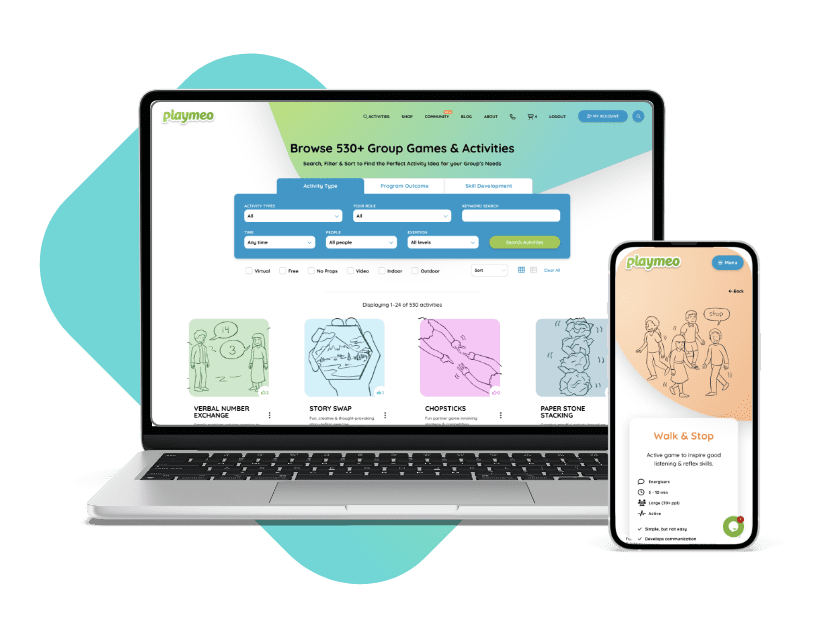Download our free 28-page ebook jam-packed with outrageously fun activity ideas.
A primary purpose of this page is to feature the exciting and burgeoning science of play and the value of connections before content.
The Science Behind the Value of Connecting Through Play
Increasingly, more and more studies report, support and elevate the importance of play especially in the development of critical language, focus, communication, problem-solving and self-control skills of young people. In the words of experts such as Dr Stuart Brown, the President of the National Institute for Play, play is as critical to the development of a human being as sleep and nutrition.
Equally, there is abundant evidence that shows that investing the time and energy to help people and groups connect, first, will amplify the results of whatever they are trying to get done. That is to say, the stronger a group’s relationships, the more successful they will be.
These efforts are rigorous, scientifically thorough and evidence-based works.
Click one or more of these links to learn more.
Articles & Research which Explore Play & Connection
- Our Epidemic of Loneliness and Isolation: The U.S. Surgeon General’s Advisory on the Healing Effects of Social Connection and Community
Dr Vivek H. Murthy, Surgeon General of the United States (2023) - Play, Cognition and Self-Regulation: What exactly are children learning when they learn through play?
Dr David Whitebread, University of Cambridge (2012) - Can Play Save The World?
Jenny Anderson, Quartz (2018) - Children’s Right to Play: An examination of the importance of play in the lives of children worldwide.
Wendy Russell & Stuart Lester, Bernard van Leer Foundation, The Netherlands (2010) - Australian Temperament Project: The first 30 years, Australian Institute of Family Studies
Suzanne Vassallo & Ann Sanson (2013) - A 32-Year Longitudinal Study of Child and Adolescent Pathways to Well-Being in Adulthood, Journal of Happiness Studies (sorry, link forbidden.)
Craig Olsson, Rob McGee, Shyamala Nada-Raja & Sheila M. Williams (2012) - How do School Connectedness & Attachment to Parents Relate in Predicting Depressive Symptoms
Ian Schochet, et al.Journal of Clinical Child & Adolescent Psychology (2008) - A Meta-Analysis of Outdoor Adventure Programming with Adolescents (sorry, link forbidden.)
Dana Cason & Lee Gillis, Journal of Experiential Education (1994) - Evaluation of Learning Away: Final Report
Sally Kendall & John Rodger, Paul Hamlyn Foundation (2015) - Adventure Education and Outward Bound: Out-of-class experiences that make a lasting difference (sorry, link forbidden.)
John Hattie, H Marsh, James Neill & Garry Richards (1997) - Using Social, Emotional & Character Development to Improve Academic Outcomes: A Matched Pair, Cluster Randomized Controlled Trial in Low Income, Urban Schools (sorry, link forbidden.)
Niloofar Bavarian, Kendra Lewis, David Dubois, Alan Acock, Samual Vuchinich, Naida Silverthorn, Frank Snyder, Joseph Day, Peter Ji & Brian Flay, Journal of School Health (2013) - The positive impact of social & emotional learning for kindergarten to eighth-grade students, Chicago, IL
John Payton, Roger Weissberg, Joseph Durlak, Allison Dymnicki, Rebecca Taylor, Kriston Schellinger & Molly Pachan, CASEL (2008) - Effectiveness of School-Based Universal Social, Emotional, and Behavioral Programs: Do they enhance students’ development in the area of skill, behavior & adjustment? (sorry, link forbidden.) Psychology in the Schools, Marcin Sklad, Rene Diekstra, Monique Ritter, Jehonathan Ben & Carolien Gravesteijn (2012)
- Brain Breaks Physical Activity Solutions in the Classroom and on Attitudes toward Physical Activity: A Randomized Controlled Trial among Primary Students from Eight Countries
Magdalena Mo Ching Mok, Ming-Kai Chin, Agata Korcz 4, Biljana Popeska, Christopher R. Edginton, Fatma Sacli Uzunoz, Hrvoje Podnar, Dané Coetzee, Luminita Georgescu, Arunas Emeljanovas, Milan Pasic, Govindasamy Balasekaran, Elizabeth Anderson and J. Larry Durstine (2020)
If you’d like to discuss the latest science and research supporting how play and connection can amplify whatever your group is trying to get done, make an appointment with Mark Collard today.






